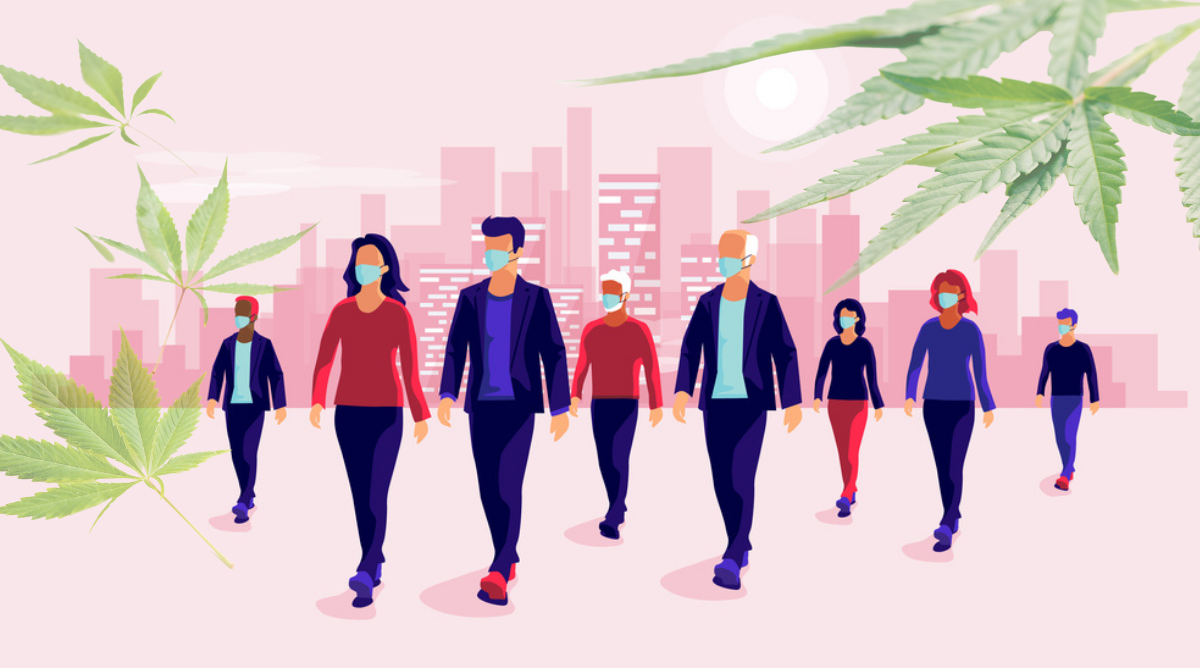The truth is, we all have cannabis-like molecules floating around in our brains. The body produces molecules called endocannabinoids, which possess functional similarities with the molecules in the cannabis plant. These endocannabinoids are self-made lipids that activate the endocannabinoid system.
The endocannabinoid system (ECS) is a vast network of receptors and metabolic pathways that are densely packed throughout the brain and body, playing a major role in various important bodily functions, including learning and memory, emotional responses, pain, sleep, and more. This system is responsible for a significant portion of the body’s neurological and physiological functions.
The ECS interacts with the cannabinoid receptors in the brain (CB1 receptors) and body (mostly CB2), which mainly control the activities of other neurotransmitters and a few other key receptors in the brain. Providing therapeutic effects varying from anxiety and pain relief, and treatment of PTSD stemmed from the ability of the ECS to help us relax and forget, which enables the body to function better, as Michael Pollan hypothesizes in his book, The Botany of Desire.
This means that the ECS, which controls major cognitive functions of the brain, works hand in hand with these cannabinoid receptors found in the cannabis plant to give the body the relief it needs. This helps the body forget painful or intrusive memories, making it a potential treatment for PTSD. It can also ease mental health conditions like depression by stimulating serotonin and dopamine, key neurotransmitters involved in mood, motivation, pleasure, and reward.
Cannabinoid receptors found in the cannabis plant stimulate these activities, raising important questions about which mental health conditions cannabis might help, and which it could potentially worsen. This guide highlights these details, helping with a better understanding of the important points to note regarding cannabis and its impacts on mental health.
THE IMPACT OF CANNABIS ON THE BRAIN
Cannabinoids found in the cannabis plant comprise numerous components, but the major components are tetrahydrocannabinol (THC) and cannabidiol (CBD), which interact with the endocannabinoid system (ECS) and many targets beyond that. THC, which is the main psychoactive constituent of the cannabis plant, binds to the CB1 receptors in the brain, producing intoxicating effects and influencing dopamine response. While CBD, the non-impairing constituent of the plant, increases endocannabinoids and binds to CB2 and serotonin receptors, inducing anti-inflammatory responses, anxiety, stress, pain relief, and lots more.
Recent research sheds positive light on the potential of the ECS, which interacts specifically with the cannabinoid receptors. However, beyond the ECS, the endocannabinoidome (eCBome) presents dozens of other cannabinoid-sensitive targets, leading to more discoveries and opening more room for numerous drugs and treatment options.
In 2014, Dr. Staci Gruber launched the MIND Program, which was the first of its kind in exploring the impact of Cannabis on the brain. Their studies generally focus on the therapeutic potential of cannabinoid-based treatments, examining their overall impact on both physical and mental health.
A result of their initial 2016 study reveals that patients reportedly performed better on cognitive tasks. In Gruber’s words, “Rather than getting worse, they’re actually getting better”. Gruber’s research has also revealed preclinical data suggesting that cannabis may help boost some bodily functions. Their 2021 follow-up study finds similar results.
Invariably, the impact of cannabis on the brain hugely depends on different factors, varying from the dosage, age, frequency, and more. A lot of people use cannabis recreationally, but taking high doses can negatively affect your brain, especially at a young age, with severe mental illness, or with high doses of THC, which is the active constituent in the cannabis plant. Experts often advise taking it mildly.
THE IMPACT OF MEDICAL CANNABIS ON MENTAL HEALTH CONDITIONS
Medical cannabis, gotten from the Cannabis sativa plant, helps ease a wide range of medical conditions. Researchers continue to explore cannabidiol’s potential in managing mental health issues such as anxiety, schizophrenia, and depression. Studies show that medical cannabis can support improvements in various mental health conditions.
Post Traumatic Stress Disorder (PTSD)
People develop PTSD, a mental health condition, after experiencing or even hearing about a traumatic event. It causes symptoms like flashbacks, nightmares, and avoidance.
Medical cannabis helps to manage PTSD symptoms by interacting with the body’s endocannabinoid system (ECS). The ECS, where the major cannabinoid receptors from cannabis, THC, and CBD bind to active sites, triggers responses that result in stress and anxiety reduction.
CBD also interacts with the amygdala, a body organ associated with fear, and the ventromedial prefrontal cortex, involved in emotional regulation, prompting responses that can ease specific symptoms linked with PTSD.
A survey of 404 PTSD patients was conducted in 2020. During this study, medical cannabis administration resulted in the reduction of PTSD symptoms by more than 50%.
An earlier 2014 study in New Mexico, which includes 80 patients, finds “greater than 75% reduction in symptom scores were reported when patients were using cannabis than when they were not.”The authors find extensive evidence that cannabinoids may facilitate the extinction of aversive memories.
Recent 2023 data concurs with these results, and some are also looking into possibly using already FDA-approved cannabinoid medicines for PTSD.
Anxiety
Anxiety is a common mental health disorder characterized by the feeling of excessive worry, nervousness, and unease. Medical cannabis is well-used for the management of anxiety disorders. The main cannabinoids of interest here are CBD and CBG, since too much THC can make anxiety worse.
In 2019, a study on 72 adults with sleep or anxiety disorders shows that CBD has the potential to alleviate anxiety. The authors conclude, “CBD displays promise as a tool for reducing anxiety in clinical populations”.
CBG had its first clinical study in 2024, where 20 mg CBG was effective for reducing anxiety in healthy adults. This was a follow-up to a 2022 clinical survey on CBG, indicating most use it for anxiety and find relief.
Another 2020 study in New Zealand evaluated the effects of CBD on 397 adults with different medical conditions, including mental symptoms. It was found that “CBD management improved self-reported quality of life measures for patients in the non-cancer pain and mental health-related symptom groups.” Participants who received CBD management for anxiety reported that they experienced improvements and reduced anxiety episodes.
Although CBD management for anxiety is widely effective, it is important to note that it doesn’t work for everyone. It is best to get professional advice from healthcare professionals and to also watch the body’s symptoms while taking it.
Medical cannabis is also known to improve the health of patients suffering from depression, ADHD, and other mood disorders.
READ: Medical Marijuana and Anti-Anxiety: Is Cannabis a Remedy for Anxiety?
Schizophrenia
2025 research finds that THC, the psychoactive compound in cannabis, can worsen schizophrenia symptoms in patients. However, the non-psychoactive constituent, CBD, alleviates some symptoms of schizophrenia, and accompanying anxiety and sleep problems.
Individuals with schizophrenia who use medical cannabis are to be closely monitored by healthcare professionals for any symptoms or adverse effects.
Bipolar disorders
The same 2025 review finds that daily use of cannabis can cause increased episodes of bipolar disorder compared to non-users.
THC, the psychoactive compound in cannabis, can trigger manic or hypomanic episodes in some individuals. CBD helps to stabilize mood and relieve anxiety, but it’s important to talk to a healthcare professional to understand the potential benefits and risks.
FREQUENTLY ASKED QUESTIONS
Can cannabis cause psychosis?
Yes. Cannabis can cause psychosis, especially in vulnerable individuals. This vulnerability varies from individuals with a family history of psychotic disorders, regular or prolonged cannabis use, or individuals with a history of schizophrenia.
Can cannabis cause serotonin syndrome?
Yes. Cannabis can potentially contribute to serotonin syndrome when combined with medications that affect serotonin levels in the body. These medications may include antidepressants like selective serotonin reuptake inhibitors (SSRIs), psychedelic mushrooms (i.e., psilocybin), and pain medications like opioids.
Can cannabis cause depression?
Cannabis does not cause depression directly. However, depression may lead to an increase in cannabis use as a coping mechanism.
It’s important to note that factors like early use, particularly in the age of adolescence or young adulthood, dosage or potency, especially in THC strains, and a history of mental health conditions may increase the risk of depression.
Does long-term cannabis use affect the brain?
Yes. Regular cannabis use over long periods may have some impact on brain function, especially in areas related to memory and emotion. Long-term users could show changes in the hippocampus, a part of the brain involved in learning and memory. These effects appear to be more pronounced in adolescents, whose brains are still developing, and may include challenges with memory or emotional regulation.
However, recent research shows that occasional cannabis use, with no history of developing dependence, does not have cannabis-related cognitive deficits. As with most things, moderation and mindful use play a key role in reducing potential risks.






